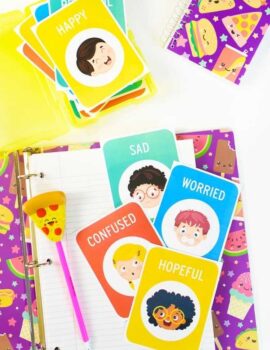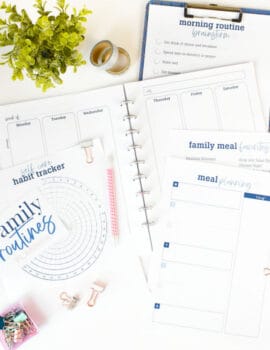Thanksgiving can be an exciting time of year, especially if you have a family gathering planned. But if you’re worried about the kids having meltdowns, it can really put a damper on your festivities.
Some families have small gatherings for the holidays and the family dynamics are familiar.
Other times, you go to a house with 20+ people and the kids don’t know half of them. The adults know the kids because of sharing and they ask the kids questions.
The kids can get nervous and – sometimes – nervousness comes across as rudeness.

Here are some ways you can enjoy a larger family gathering (Thanksgiving or otherwise) without the Extra Emotions.

Pull out these fun connecting questions to share some laughs with your precious ones!
Use them at:
- meal times
- car rides
- as a “calm down” trick
- for dinner time conversation
- or any time the day is getting chaotic or
- you need a reset to connect.
1. Watch Out for Sensory Overload
Not every child deals with large crowds, loud noises, multiple people talking at the same time, or new places well…
The truth is, these types of situations can be over stimulating for some. This is especially true if your child is Introverted or has a sensory processing disorder.
That being said, you’ll want to enter into a large Thanksgiving event with understanding towards how your little one may be feeling.
Nothing sets a meltdown in order like an over-stimulated child in a sensory overload situation.
Tips on Handling Sensory Overload
- Prepare them ahead of time by explaining what they may expect from people, environment, and situations.
- Comfort them with the knowledge that they will be safe and that you will be close when needed.
- Provide a quiet place/outlet for them and teach them to use it when needed.
- Don’t expect them to be social right away, hug every person in the house, or give speeches about their accomplishments.
- Keep a close eye on them and help direct them to their pre-arranged quiet place if you see they are on sensory overload.

Emotions are a H U G E part of a young child’s life. These “I Am Feeling” cards will reduce tantrums, meltdowns, and help your little one learn emotional awareness.
Learn More
2. Review Calming Strategies
One of my boys is a very straight forward introvert. He requires calm down time and quiet spaces to process new situations and overloads.
It took me a little while to discover that he wasn’t upset about being somewhere with us. He wasn’t being spoiled rotten or wanting to cause a major meltdown. Actually, he just needed a little time to decompress.
Now, we have some calming strategies in place and review them before major events like family gatherings.

Pull out these fun connecting questions to share some laughs with your precious ones!
Use them at:
- meal times
- car rides
- as a “calm down” trick
- for dinner time conversation
- or any time the day is getting chaotic or
- you need a reset to connect.
Here’s a few strategies that have worked for us:
- Quiet reading– Reading is a calm outlet that allows the child to “get away” for a bit.
- Specified location for quiet time– Plan a spot ahead of time and designate it for your child to use if needed.
- Letting them bring a toy or two – Let your child choose a quiet toy they can play with, this can help them calm down and feel familiar even in a new place.
Even though not all my children are introverted, they all benefit from knowing and being able to use their calming strategies when needed.
3. Consider the change in routine & prepare for It
Will this Thanksgiving bring travels?
Are you going to have to adjust your nap time, bedtime, or eating routine? Instead of just “going for it”, why not begin to prepare for this disruption ahead of time?
For example, if you know that you’re going to be eating later than usual on your trip, plan a few dinners the week before to be a bit later than usual.
This simple preparation may prevent a meltdown when the time comes. It’s sort of a reverse jet lag or time change strategy.

Take our 3 day challenge to create life-giving family, child, and self-care routines.
Learn More
4. Bring a sensory activity
When a child is under some stress from their environment, a simple sensory activity can ground them and bring them back to a place of peace.
There are tons of fun sensory activities that don’t involve screens… check out a few of these:
- Wikki Stix– My kids love this one. They are mess free and provide hours of sensory fun.
- Sensory Toy for Basic Skills – Perfect for on the go and recommended for ages 1-6.
- Playfoam, Go!– Fun and easy to transport in a safe box with dividers and space to play.
- Popping Fidgets– They are all the rage this year. They provide sensory comfort and entertainment.
- Magnetic Pattern Bocks– There are patterns to complete or endless possibilities for creativity with these pattern blocks.
 11 Handy Ways To Do Hygge As A Family
11 Handy Ways To Do Hygge As A Family 40+ Fall Family Traditions Everyone Will Love
40+ Fall Family Traditions Everyone Will Love 5 Reasons Bedtime Stories are More Important Than You Think
5 Reasons Bedtime Stories are More Important Than You Think Family Christmas Traditions Your Kids Will Remember For A Lifetime
Family Christmas Traditions Your Kids Will Remember For A Lifetime 5. Don’t push physical contact to avoid meltdowns
Everybody’s personal preference on hugging, kissing, and grandma’s face squeezes may be different. However, one things remains-
None of those things should be pushed onto or required.
To avoid meltdowns, allow kids to determine their boundaries when it comes to physical contact.
I remember my father-in-law telling a story about when my sister-in-law was a little girl:
You see, she only gave backwards hugs. If a loved one went in for a hug, she would turn her back and give a backwards hug. It’s what made her feel comfortable.
And they allowed her to choose. It was healthy and safe for her… and she wasn’t forced into a meltdown by compromising that.

Pull out these fun connecting questions to share some laughs with your precious ones!
Use them at:
- meal times
- car rides
- as a “calm down” trick
- for dinner time conversation
- or any time the day is getting chaotic or
- you need a reset to connect.
6. Talk about foods beforehand
There’s nothing quite as cringey as your child complaining at the table about the food that someone else has prepared for them.
It’s even worse if it leads to a meltdown. People begin to feel sorry for you, judge your parenting, and some even turn it on themselves and think it’s their fault.
Honestly, it can become a big mess.
So, it you know your “Aunt Sue” is going to prepare her famous gelatin… prepare your kids for that ahead of time.
Whatever you decide to do, teaching some table expectations beforehand may be good idea.


 Advent Cards
Advent CardsTis the season… countdown to Christmas with these lovely advent cards .
.
Learn More
7. Be present & aware
Don’t assume that because you’re comfortable… that means your kids are too.
Sometimes I tend forget that my children don’t know all of my distant aunts and uncles names. They aren’t as familiar with their personalities and voices.
What seems to me like a laid back and fun family time, may be a roller coaster of fear for them. So, don’t push them into the house and leave them with people they don’t know very well… even if they are family. This may cause a major meltdown.
Instead, allow them to remain close to you. Be aware of their feelings and gently introduce them until they are comfortable.

Pull out these fun connecting questions to share some laughs with your precious ones!
Use them at:
- meal times
- car rides
- as a “calm down” trick
- for dinner time conversation
- or any time the day is getting chaotic or
- you need a reset to connect.
8. Keep an attitude of gratitude
Gratitude is being able to show thankfulness, even when you don’t feel like it. Kids learn from watching us and how we handle situations.
No matter what happens at your family Thanksgiving gathering, if you will choose to keep an attitude of gratitude… your kids will learn from that.
There are some great tools and resources available to teach gratitude. Here is a great one:

Gratitude is a learned skill. Help avoid selfishness and entitlement by nurturing gratitude.
Learn More
FAQs
Bring some books and activities that they will enjoy to keep them entertained as they wait. Consider going on a walk or going to a park if you will have most of the day with minimal activities planned.
If your kids are old enough, tell them ahead of time that they can come to you and whisper that they need a break or have a code word that means they need a bit of alone time. Then, find a quiet spot in the place you will be, if not in your own home, that they can retreat to if they need to.
How to be a confident parent with extended family is a great place to start. Prepare your kids ahead of time, be proactive with scheduling/napping/down time needs, hold your boundaries and know that you are the mom. If you have a family member who comments on your kids’ behavior or your parenting style regularly, come up with a phrase that you can say to them ahead of time that aligns with your boundaries.
The post 8 Tips to Survive a Thanksgiving Gathering Without Meltdowns appeared first on A Mother Far from Home.